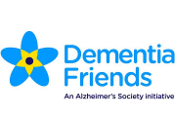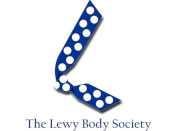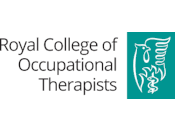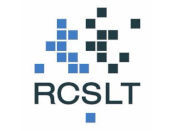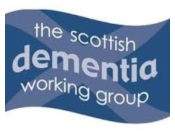
Living with dementia: toileting and continence
Living with dementia: toileting and continence
This factsheet is available for sponsorship, email marketing@dlf.org.uk
Sponsorship has no influence on our impartial content
Factsheet contents
- Introduction
- Getting on and off the toilet
- Grab rails
- Toilet seats
- Continence
- Liners, pads and pants
- Commodes
- Urinals
- Waterproof bed and chair covers
- Incontinence alarms and sensors
- RADAR keys
- Swimwear
- Wash dry toilet
- Dignity trousers
- Assessing your needs
- Provision of equipment
- Funding sources for care
- For further advice from us
- Contributors
- Useful organisations and resources
- References and further reading
Introduction
People living with dementia are likely to encounter difficulties with using the toilet and continence. Difficulties may arise from the person:
- not reacting quickly enough to the sensation of needing to use the toilet
- not being able to reach the toilet in time due to poor mobility
- encountering difficulties in finding the bathroom or recognising the toilet.
In some cases, if they are confused about their surroundings (due to cognitive impairment) they may mistake everyday objects - such as a waste paper basket for example - as a toilet, and subsequently use this to urinate in. This can be a distressing problem and is known as visual agnosia (Tomsack, Rembler, 1990).
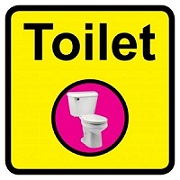 The following tips may help a person with dementia in locating and using the toilet more easily.
The following tips may help a person with dementia in locating and using the toilet more easily.
Signage. The use of a sign on the bathroom door can be of benefit to those with dementia, especially if they become disorientated and can not recall where the bathroom is located. A sign in a contrasting colour to the door, displaying a combination of words and a picture, can be the most noticeable. It should also be clearly visible, ideally positioned in the person's line of vision.
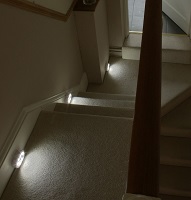 Colour contrast. People with dementia or poor vision may find it difficult to see the toilet seat or grab rail, especially if the bathroom suite is all white. In a room of similar colours and shades, the use of contrasting colours, e.g. a black/dark blue toilet seat on a white base, can make these more visible and identifiable. “Hot” colours such as red, orange or yellow can be of benefit.
Colour contrast. People with dementia or poor vision may find it difficult to see the toilet seat or grab rail, especially if the bathroom suite is all white. In a room of similar colours and shades, the use of contrasting colours, e.g. a black/dark blue toilet seat on a white base, can make these more visible and identifiable. “Hot” colours such as red, orange or yellow can be of benefit.
Lighting. Adequate lighting is essential, especially when somebody is getting up during the night to access the bathroom. Motion sensors or night lights may help someone with dementia to identify the route to the bathroom and allow them to locate it with more ease. A small light within the bathroom can also be of benefit in enabling to person to safely identify where the toilet is.
Getting on and off of the toilet
If a person with dementia requires extra stability when accessing the toilet and/or lowering themselves onto or off the toilet seat, there are many solutions that can help to reduce the risk of falls.
Grab rails
If the wall is constructed of plaster board, a grab rail cannot be fitted as it will not be secure.
In this instance alternatives like a floor fitted rail or toilet surround can be considered.
If the person needs to hold onto a bath, sink or radiator to help themselves stand, a simple grab rail can be fitted to the wall to provide support. The rail/s should be positioned at the correct height for the user to reach easily.
Rails that are in a contrasting colour to the bathroom walls can make them stand out and can be beneficial in helping people who may have difficulty distinguishing objects from their background to see them.
A floor fitted rail is secured to the floor at either one or both sides of the toilet. These are usually used when the wall is not of a suitable construction or there is no wall nearby to fix them to.
Floor fitted rails or toilet surrounds can be a trip hazard to those with impaired eyesight.
They can also restrict access to the wash basin, depending on the layout of the bathroom.
Toilet surrounds are free standing and can be fitted around the toilet to provide bilateral rails. As they are free standing, they can be easily removed when they are not in use.
In some circumstances, the toilet surround can be secured to the floor - this is of benefit if the user tends to lean heavily on one side, i.e. due to a stroke, or that they need the reassurance that it will not move when being used.
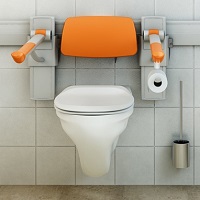 Drop down rails can either be wall mounted or fitted to the floor behind the toilet and are physically lowered into a horizontal position when in use.
Drop down rails can either be wall mounted or fitted to the floor behind the toilet and are physically lowered into a horizontal position when in use.
When they are not being used, the drop down rail can be stored in a vertical position, providing better access to the area surrounding the toilet.
This may also be of benefit to those using a wheeled walking aid or wheelchair.
Further reading: More information on grab rails, including positioning and fixing, can be found in DLF's factsheet, Choosing and fitting grab rails.
Toilet seats
Due to aging and/or the progression of dementia, especially Alzeheimer’s and Lewy body dementia (Stavitsky Brickman 2006) a person with dementia may find it more difficult to rise from low positions - i.e. chairs, the bed and the toilet.
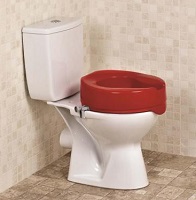 Raised toilet seats can increase the height of the toilet, which may enable someone to rise with more ease. The toilet seats come in a range of heights and are easily fastened onto the toilet and can be removed for cleaning.
Raised toilet seats can increase the height of the toilet, which may enable someone to rise with more ease. The toilet seats come in a range of heights and are easily fastened onto the toilet and can be removed for cleaning.
Some people do not like using raised toilet seats, either due to the colour, the size of aperture or their overall appearance. In these cases it is possible to purchase a plinth which can be fitted under the existing toilet pan, providing the (permanent) raise in height required.
Sometimes a combination of a raise in height and rails are required to help someone get on and off from the toilet independently and safely. The toilet frame and seat provides bilateral rails and a height adjustable toilet seat which can be fitted over the top of the toilet and can also be fixed to the floor if required.
NB: In some cases, the individual with dementia may require verbal/physical prompting to place their hands on the rails, rather than pulling up on their zimmer frame or using a nearby radiator.
A toilet riser assist can help individuals who may still be struggling and require assistance when rising from the toilet to maintain their independence. This is a battery operated frame that fits over an existing toilet. When the user is ready to stand, they press a button which operates the toilet seat. The seat then rises, helping the person into a standing position.
The toilet riser assist is available with or without rails for support. It is likely that an individual with dementia would require verbal prompting and assistance to use the controls safely.
For further advice and/or an individual assessment contact your local social services and ask to arrange an assessment with an occupational therapist.
Continence
As a person's dementia progresses continence can become more of an issue, especially if the individual is unable to communicate that they need to go to the toilet. For those with poor mobility, or who receive limited warning that they require to go to the toilet, accessing the toilet on time is not always possible.
There are many different aids and devices that can be used to help maintain an individual's continence.
Liners, pads and pants
If someone is encountering difficulties with urinary/bowel incontinence, it is advised that they seek medical advice in case they have an undiagnosed medical condition, i.e. urinary tract infection.
It is important to address continence issues promptly as prolonged skin contact with moisture can increase the risk of pressure sores. (NHS Stop the Pressure, 2017)
For many people “dribbling” urinary incontinence can be problematic. There are many products that can be used to help deal with this such as liners, pads and pants which can help absorb any leakage.
On occasion, a person may feel embarrassed with having had to use a pad and may try to hide soiled clothes/pads in drawers etc. In this situation it may be helpful chat to them about this in order to reassure them and alleviate any embarrassment. Involving them in choosing a bin for example, which is clearly labelled and in which they can discard their used pads, may normalise the process and so make it seem less embarrassing.
Some people may feel less embarrassed with using incontinence pants instead of pads, as they can appear to be more like normal underwear. In addition, they are easier for some people to manage independently as they are similar to standard pants.
Many of these products can be purchased in supermarkets, however, a review by your local Continence Advisor is advocated. A Continence Advisor can provide advice and help with any continence issues and in some cases pads can be prescribed.
Commodes
In some cases, physically getting to the toilet can be the biggest difficulty.
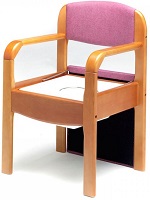 Positioning a commode next to a bed can be beneficial if someone is unable to access the toilet overnight - for example due to its location or if the individual is at risk of falls. Alternatively, if the toilet is located upstairs and the individual is unable to ascend/descend the stairs safely or independently, then a commode can be positioned downstairs.
Positioning a commode next to a bed can be beneficial if someone is unable to access the toilet overnight - for example due to its location or if the individual is at risk of falls. Alternatively, if the toilet is located upstairs and the individual is unable to ascend/descend the stairs safely or independently, then a commode can be positioned downstairs.
Some may feel embarrassed at having a commode downstairs. However there are many styles which are designed to look like standard chairs, and for some people these styles can help make it more acceptable for them to use the commode in the lounge or dining room.
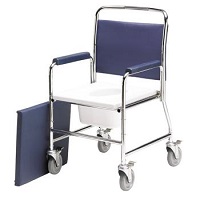 Where space allows, an attendant propelled wheeled or mobile commode can be used to help an individual access the toilet.
Where space allows, an attendant propelled wheeled or mobile commode can be used to help an individual access the toilet.
The individual can be assisted onto the commode, which can then be wheeled into the bathroom and positioned over the toilet.
It can also be used as a traditional commode and some types can double as a wheeled shower chair, used to access wet floor shower areas.
Urinals
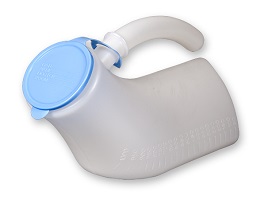 For many, the use of a male or female urinal can be an easy solution. They take up less space than a commode, however the individual must have the dexterity and balance to use this appropriately. As dementia progresses some people may find urinals more difficult to use. There are also male and female travel urinals on the market, but again these may be difficult for some people with dementia to use without assistance of a carer.
For many, the use of a male or female urinal can be an easy solution. They take up less space than a commode, however the individual must have the dexterity and balance to use this appropriately. As dementia progresses some people may find urinals more difficult to use. There are also male and female travel urinals on the market, but again these may be difficult for some people with dementia to use without assistance of a carer.
Bed pans can be useful for those who are unable to get out of bed to access the toilet or commode.
Where a medical issue is causing difficulties with continence, a catheter or urisheath can be an appropriate option to meet the individuals needs, however this must be discussed with the person’s GP, district nurse or continence advisor.
Waterproof bed and chair covers
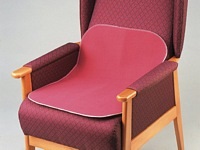 If you are concerned about protecting chairs and bedding from urine, disposable and washable waterproof bed sheets and chair covers can help prevent any leakage from reaching the chair or the mattress.
If you are concerned about protecting chairs and bedding from urine, disposable and washable waterproof bed sheets and chair covers can help prevent any leakage from reaching the chair or the mattress.
Disposable pads also help reduce the amount of washing needing to be done. However, they can prove costly over time.
Incontinence alarms and sensors
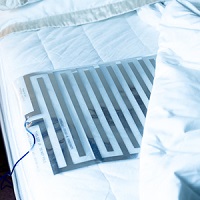 Incontinence alarms can be placed in a bed. An alarm will sound when they are activated by drops of urine, making the individual or carer aware that personal hygiene needs are required to be attended to. Alerts to excessive moisture can also help to prevent damage to the person’s skin.
Incontinence alarms can be placed in a bed. An alarm will sound when they are activated by drops of urine, making the individual or carer aware that personal hygiene needs are required to be attended to. Alerts to excessive moisture can also help to prevent damage to the person’s skin.
Some models are designed so that the alarm signal is received by the carer only, so as not to distress the person with dementia.
RADAR keys
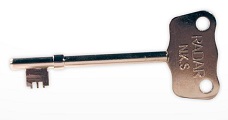 A RADAR key can provide access to over 9,000 accessible public toilets within the UK. RADAR National Key Scheme (NKS) keys are only available to people who require use of the toilet facilities due to their disability or health condition.
A RADAR key can provide access to over 9,000 accessible public toilets within the UK. RADAR National Key Scheme (NKS) keys are only available to people who require use of the toilet facilities due to their disability or health condition.
Swimwear
Continence problems need not stop people with dementia engaging in gentle exercise such as swimming. Swimsuits designed specifically for people with continence problems have secure internal liners and/or openings which can help carers in putting the swimsuit on and taking it off again.
Wash dry toilet
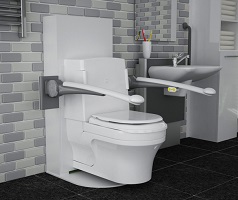 For people with dementia who have difficulty cleaning themselves following toilet use, the wash dry toilet is designed to clean and dry the skin, thus reducing the risk of pressure sores. (NHS Stop the Pressure, 2017). It may also assist carers to clean a person thoroughly following an incontinence 'accident'.
For people with dementia who have difficulty cleaning themselves following toilet use, the wash dry toilet is designed to clean and dry the skin, thus reducing the risk of pressure sores. (NHS Stop the Pressure, 2017). It may also assist carers to clean a person thoroughly following an incontinence 'accident'.
When flushed, the wash dry toilet emits jet sprays of warm water, allowing hygienic cleaning of personal areas. A stream of warm air is then emitted, to dry the skin.
Some people with dementia may require the assistance of their carer or family member to use the product. It would be advisable to try the toilet before purchasing, as not every one may be comfortable with the sensation of the warm air and spray.
If the person has difficulty with getting onto the wash dry toilet, an over-toilet wheeled commode chair may be an option.
Dignity Trousers
 As dementia progresses, continence problems can become greater.
As dementia progresses, continence problems can become greater.
Having to change clothing frequently during the day due to incontinence can be challenging for carers and stressful for the person with dementia.
Trousers with zipped seams can be a solution. The trousers can be taken off while in a lying or standing position and the zips are designed so that they do not cause discomfort.
Assessing your needs
A range of conditions may cause forgetfulness, anxiety, low mood and confusion, however they may also be early signs of dementia. A visit to your GP would be recommended to rule out other causes and allow for a better understanding of the illness and how it may progress, as well as strategies on how to manage the symptoms.
The assessment for dementia is a process that takes time and goes through various stages and tests. These may include a physical examination, a blood test and interviewing both the person and their concerned friend/relative separately. This may lead to a referral to a local memory service or clinic. The GP, Community Psychiatric Nurse or a member of the memory clinic staff will be able to advise on symptoms, how the disease may develop and provide information on appropriate treatment. They will also be able to advise you on what support there is available locally. Prior to an appointment it can be useful to keep a journal or diary of any tasks that have become more difficult or concerns that you may have.
The GP can refer you for a Health and Social Care Needs Assessment, or you can contact your local authority Adult Social Care Department and make a self-referral, or have a friend or relative do it for you. By law anyone who appears to need care and support can request an assessment regardless of their income or savings.
The assessment will focus on your needs, how they impact on your well-being and on what you want to achieve and will aim to identify any difficulties you may have in caring for yourself. An Occupational Therapist will carry out the assessment and will be able to advise on strategies to help reduce any identified risks and recommend any equipment that may be helpful to maintain independence. If someone else is helping you they are also entitled to a carers assessment, which will help to identify what help and support they may need.
There are a number of charitable organisations listed below that can provide help and support for the person with dementia and their relatives and carers.
Provision of equipment
Many simple assistive technology devices mentioned in this fact sheet can be privately purchased. Others can be provided by local authorities or the NHS to meet an assessed need; you or a family member can request a home assessment from an occupational therapist
Permanent loan: Local Authority and health provision
If you require disability equipment, telecare or adaptations to your home then your local authority may be able to help. They can supply equipment or minor adaptations that cost under £1,000, free of charge. (Department of Health 2014, section 2.9). In Scotland, Local Authorities make their own arrangements for provision of minor adaptations and details can be accessed via your Council's website.
Some equipment such as pressure relieving cushions, mattresses, some mobility aids and wheelchairs are supplied by your local Health Authority. A referral to the District Nurse or Wheelchair Service for these items can be made via your GP or other health professionals including a Community Occupational Therapist or Physiotherapist.
Disabled Facilities Grant (DFG)
Should you need adaptations to your home that cost more than £1,000 that will allow you to continue to live there, you may be eligible for a Disabled Facilities Grant (DFG). An Occupational Therapist will complete an assessment and if the work is deemed necessary to meet your needs and is reasonable and practical, then they will arrange for a financial assessment to be undertaken.
If you meet the criteria for funding, the Occupational Therapist will make recommendations for the adaptations required.
Private purchase
If you do not wish to use local authority services, there are independent Occupational Therapists who can assess your needs and help to advise or assist you in buying any equipment or arrange adaptations to your home that you may require.
You can also purchase equipment privately, but it is recommended that you compare different options first. There may be an equipment demonstration centre near you where you can look at and try out equipment before purchasing, as well as receiving impartial advice.
Charity and Grant funding
Charitable trusts may sometimes provide equipment or give a grant for equipment purchase.
Turn2Us is a national charity that helps people who are in financial difficulty find grants for the provision of equipment, and Community Care gives a list of charitable organisations that give grants.
Charities tend to give awards in accordance with a predetermined criterion, so it is important that you carefully select the organisations that apply to your condition. There are also some workplace charities that will provide support for ex-employees. If you are or have served in the Armed Forces, or are a dependent or carer of a person who has served, The Royal British Legion may be able to provide you with support for specialist dementia care or grants for equipment and adaptations to your home, or small crisis grants to meet unexpected expenses.
Funding sources for care
If you need support with daily tasks that may include help from a carer, the delivery of meals or residential care then your local authority may help with the cost. How much support you are entitled to will depend on your income and savings and what your care needs are. A financial assessment of your means will be carried out to establish how much support you are entitled to.
You may be eligible for further financial support such as Attendance Allowance or Personal Independence Payment (PIP) and if you have a person who cares for you for 20 hours or more a week, they may be eligible for some financial support.
If you live alone you can apply to your local authority for a 25% reduction on your Council Tax bill, or if you live with someone else then they may be eligible for a 25% reduction on the Council Tax bill. As your condition progresses, they may be eligible for a further 25% reduction.
Private carers and residential care
If you are looking for a carer or are considering residential care, then you should ensure that the staff are trained in dementia care and are able to give the specialist help you need. A residential home should be designed to provide the best possible environment for you. There are a number of organisations that can help you with choosing a suitable home, including:
- Elderly Accommodation Council
- Housing Care.org
- DementiaUK
- Relatives and Residents Association
- Paying for Care
Care Home ratings/selector
Inspection reports and care home ratings can be found via:
- England – Care Quality Commission
- Scotland – Care Inspectorate
- Wales – Care Inspectorate Wales
- Northern Ireland – Regulation and Quality Improvement Authority
Charity and Grant funding
Charitable trusts may sometimes provide funding for care, nursing or residential respite, permanent care or a befriending service. Charities tend to give awards in accordance with a predetermined criterion, so it is important that you carefully select the organisations that apply to your condition. There are also some workplace charities that will provide support for ex-employees. If you are or have served in the Armed Forces, or are a dependent or carer of a person who has served, The Royal British Legion may be able to provide you with support for specialist dementia care or small crisis grants to meet unexpected expenses.
Further information relating to grants is available from:
- Community Care – a list of charities providing grants.
- Turn2us - Turn2us is a national charity that helps people in financial hardship gain access to welfare benefits, charitable grants and support services.
- Housing grants information from Disability Rights UK - led by people with diverse experiences of disability and health conditions, from different communities.
- Disability Grants - grants for disabled adults.
- My grants - accessibility grants for disabled and older people.
- Grants for individuals - this website is run by the Directory of Social Change and lets subscribers search for grants. It is intended for organisations searching for funding on behalf of individuals.
- The Money Advice Service - Charitable grants and major and minor adaptations.
VAT relief
If you have a diagnosed long-term condition, you may be able to claim VAT relief on purchases relating to the condition. The company supplying the equipment should be able to advise you, or there is general information on VAT relief on the GOV.UK website.
For further advice from us
For clear, practical advice and information on products and suppliers of daily living equipment, please have a look at our Living made easy website.
If you would like further advice related to choosing equipment for everyday living you could try relevant sections of AskSARA, our free online guided advice tool. AskSARA will ask you questions about yourself and your environment and then offer relevant advice, product suggestions and supplier details.
You can contact the DLF Helpline, which is open Monday to Friday from 10am to 4pm. Tel: 0300 999 0004 (calls charged at your standard land line rate even if you are phoning from a mobile).
Alternatively, you may wish to contact us via email: info@dlf.org.uk or by letter: DLF, 34 Chatfield Road, Wandsworth, London SW11 3SE.
To help us give you a concise and informative reply, please provide us with as much detail as possible, including information on the difficulties you are having and any solutions you have considered, such as equipment ideas.
Another source of advice is a disabled or independent living centre where you would have the opportunity to try out a range of equipment. There are several of these around the country where you can go for impartial advice. Your local authority will also be able to give you details of centres in your area.
Contributors
Fiona Cowan
 Fiona Cowan qualified with a BSc Occupational Therapy from Queen Margaret College, Edinburgh, in 1996 and has gained a wealth of knowledge and experience in providing services for adults and older people in a number of settings. In 2005, Fiona achieved her MSc in Gerontology and has more recently successfully completed Scotland's National Dementia Champions programme. With over 22 years experience of working with older people, Fiona has developed a wide ranging knowledge of aids, equipment and enabling technology that can assist older people to remain safe and as independent as possible.
Fiona Cowan qualified with a BSc Occupational Therapy from Queen Margaret College, Edinburgh, in 1996 and has gained a wealth of knowledge and experience in providing services for adults and older people in a number of settings. In 2005, Fiona achieved her MSc in Gerontology and has more recently successfully completed Scotland's National Dementia Champions programme. With over 22 years experience of working with older people, Fiona has developed a wide ranging knowledge of aids, equipment and enabling technology that can assist older people to remain safe and as independent as possible.
Roisin Hodgson
 Roisin Hodgson qualified as an occupational therapist in 1993 and has worked extensively in hospitals and within the community. Now working as a private occupational therapist, Roisin has an interest in occupational therapy approaches to anxiety, panic and post traumatic stress disorder. Many of Roisin's clients have dementia; she works with them and their families advising on a range of solutions to help maintain independence, including home adaptations, daily living aids and telecare.
Roisin Hodgson qualified as an occupational therapist in 1993 and has worked extensively in hospitals and within the community. Now working as a private occupational therapist, Roisin has an interest in occupational therapy approaches to anxiety, panic and post traumatic stress disorder. Many of Roisin's clients have dementia; she works with them and their families advising on a range of solutions to help maintain independence, including home adaptations, daily living aids and telecare.
Nina Evans
 Nina Evans works alongside the design team at Designability. Working in partnership with users, carers and professionals, Nina carries out clinical trials with end-users, developing and promoting assistive technology to improve quality of life. Nina's qualifications include a Diploma of the College of Occupational Therapists and an MSc in Clinical Research.
Nina Evans works alongside the design team at Designability. Working in partnership with users, carers and professionals, Nina carries out clinical trials with end-users, developing and promoting assistive technology to improve quality of life. Nina's qualifications include a Diploma of the College of Occupational Therapists and an MSc in Clinical Research.
Useful organisations and resources
Age UK Advice is a free, confidential, national phone service for older people, their families, friends, carers and professionals. Their team of experts can provide advice and information on a number of topics including benefits, concerns about hospital stays, advice choosing care homes etc. The website can signpost you to local services including home helps, foot care, handy person services and dementia support.
The Age UK network includes Age Scotland, Age Cymru and Age NI.
Alzheimer's Society's website provides advice and support regarding all aspects of dementia – including the different types of dementia, symptoms, diagnosis and treatments available. They also run Dementia Connect, a comprehensive services directory for people affected by dementia - areas cover England, Wales and Northern Ireland.
.
Website: www.alzscot.org
24 hour Dementia Helpline: 0808 808 3000
Alzheimer Scotland provides a wide range of specialist services for people with dementia and their carers. They offer personalised support services, community activities, information and advice at every stage of the dementia journey.
Disabled Living
Burrows House, 10 Priestley Road
Wardley Industrial Estate, Worsley
Manchester, M28 2LY
Website: www.bbuk.org.uk
Telephone: 0161 607 8219
Email: bbuk@disabledliving.co.uk
Bowel and Bladder UK's National Confidential Helpline is managed by a team of Specialist Nurses and Continence Product information staff, who can be contacted for advice on specialist services, product information and general advice to help treat or manage bladder and bowel problems that may occur as a symptom of Dementia. Opening hours Monday to Friday 9am–4.30pm.
5th Floor, Charles House
148/9 Great Charles Street Queensway
Birmingham, B3 3HT
Website: www.bda.uk.com
Telephone: 0121 200 8080
The BDA is the only body in the UK representing the whole of the dietetic workforce. It is a trade union and professional body representing the professional, educational, public and workplace interests of its members.
Head Office
20 Great Dover Street
London SE1 4LX
Website: www.carersuk.org
Telephone: 020 7378 4999
Carers UK provide advice and support for all carers, whether they are new to looking after someone or have been a carer for a long time. Their telephone advice and support service is available if you wish to talk to someone about caring, with further information and advice available on the website. The website also provides contact details for Carers Wales, Scotland and Northern Ireland.
Carewatch Care Services Ltd
Libra House, Sunrise Parkway
Linford Wood
Milton Keynes MK14 6PH
Website: www.carewatch.co.uk
Telephone: 01908 557 950
Carewatch provide home care services throughout the UK, designed to enable people to remain as independent as possible within their own home. They offer multiple services including home visits, personal care, practical help, live-in care and dementia care at home and long term home care.
Dementia Friends provides information, support and learning for those who have a relative or know someone with dementia. Anyone of any age can be a dementia friend. Visit their website for more details.
Second Floor
356 Holloway Road
London N7 6PA
Website: www.dementiauk.org
Telephone: 020 7697 4160
Support line: 0800 888 6678
Dementia UK provide specialist dementia support for families through their Admiral Nurse service. The Admiral Nurses work with families giving one-to-one support, expert guidance and practical solutions.
Unity House
Westwood Park
Wigan, WN3 4HE
Website: www.lewybody.org
Telephone: 01942 914000
Support line: 0800 888 6678
Email: info@lewybody.org
The Lewy Body Society funds research into Dementia with Lewy Bodies (DLB). It's mission is to raise awareness of DLB among the general public and those in the medical profession and decision making positions, They also provide information resources for patients and carers.
Website: www.nhs.uk
NHS Choices provides comprehensive information on the help and support available for people living with dementia. Other NHS websites include: NHS Inform (Scotland), Health and Social Care online (N.I.) and NHS Direct Wales.
Website: www.nhs.uk
The Patient Advice and Liaison Service from the NHS offers confidential advice, support and information on health-related matters. They provide a point of contact for patients, their families and their carers when using NHS services. Your local PALS service can be located using the search facility on their website.
Website: www.nice.org.uk
NICE provides national guidance and advice to improve health and social care.
The RICE Centre
Royal United Hospital
Combe Park
Bath, BA1 3NG
Website: www.rice.org.uk
Telephone: 01225 476420
Email: info@rice.org.uk
RICE is a registered charity committed to undertaking and publishing effective research aimed at improving the diagnosis, assessment and treatment of people with Alzheimer’s disease and other forms of dementia. The charity also offers several healthcare services for people living with dementia including a memory clinic.
106-114 Borough High Street
Southwark
London SE1 1LB
Website: www.rcot.co.uk
Telephone: 020 7357 6480
Email: reception@rcot.co.uk
The Royal College of Occupational Therapists is the professional membership body for occupational therapy staff in the UK. Their website includes information on how to find an independent occupational therapist through their online directory.
2 White Hart Yard
London SE1 1NX
Website: www.rcslt.org
Telephone: 020 7378 1200
The RCSLT is the professional body for speech and language therapists in the UK providing leadership and setting professional standards.
81 Oxford Street
Glasgow, G5 9EP
Website: www.sdwg.org.uk
Telephone: 0141 410 1171
Email: sdwg@alzscot.org
Funded by Alzheimer Scotland and the Scottish Government SDWG is an independent group run by people with dementia, their families and carers, which campaigns on behalf of, and provides a voice for, people living with dementia in Scotland.
Watson House
54 Baker Street
London W1U 7EX
Website: www.scie.org.uk
Telephone: 020 7766 7400
Email: info@scie.org.uk
The Social Care Institute for Excellence (SCIE) improves the lives of people who use care services by sharing knowledge about what works. It is a leading improvement support agency and an independent charity working with adults’, families’ and children's care and support services across the UK. The website contains a library of resources and services on wide range of topics, including dementia.
SFE Administrator
Studio 209, Mill Studio Business Centre
Crane Mead
Ware
Hertfordshire, SG12 9PY
Website: www.sfe.legal
Telephone: 0844 567 6173
Email: sfe@standagency.com
Solicitors for the Elderly provide a service to help you locate a local solicitor, near you, to help you with wills, power of attorney, trusts, probate, paying for care and other legal needs. They are a national organisation across the UK and the Republic of Ireland
Wimslow House
Water Lane
Grove Way
Wimslow, SK9 5AG
Website: www.tsa-voice.org.uk
Telephone: 01625 520320
Email: admin@TSA-Voice.org.uk
The website has information on the telecare industry and the services it provides to individuals. The TSA aims to promote and support the telecare industry and highlight the benefits of telecare for service users, their friends, family and carers.
Released January 2019, to be reviewed by January 2022, Version 1
References and further reading Show references
Alzheimer’s Society: Sight, perception and hallucinations in dementia. Available from: https://www.alzheimers.org.uk/sites/default/files/pdf/sight_perception_and_hallucinations_in_dementia.pdf
NHS Midlands and East 2017: NHS Stop the Pressure - How to manage incontinence/moisture. Available from http://nhs.stopthepressure.co.uk/How-To-Guides/howtogreatskinincontinencefinal.pdf
Mario F. Mendez, M.D., Robert L. Tomsak, M.D., Ph.D., and Bernd Remler, M. D. (1990) Disorders of the Visual System in Alzheimer's Disease https://www.researchgate.net/publication/21017088_Disorders_of_the_visual_system_in_Alzheimer's_Disease
Stavitsky, Karina Stavitsky, BS., Brickman Adam M. PhD; Scarmeas, Nikolaos, MD., Torgan, Rebecca L, BS; Tang, Ming-Xin, PhD., Albert, Marilyn, PhD., Brandt, Jason, PhD., Blacker, Deborah, MD., Stern, Yaakov, PhD.
(2006) Progression of Cognition, Psychiatric Symptoms, and Functional Abilities in Dementia With Lewy Bodies and Alzheimer Disease. Reprinted Arch Neurol/Vol. 63
AskSARA
If you would like further advice regarding daily living equipment related to choosing equipment for everyday living you could try relevant sections of AskSARA. AskSARA is our free online guided advice tool. AskSARA will ask you questions about yourself and your environment and then offer relevant advice, product suggestions and supplier details.
Visit AskSARA's Toilet section
| Attachment | Size |
|---|---|
| 14.33 KB | |
| 10 KB | |
| 12.71 KB | |
| 13.85 KB | |
| 11.85 KB | |
| 10.21 KB | |
| 29.26 KB | |
| 10.75 KB | |
| 48.75 KB | |
| 6.62 KB | |
| 33.93 KB | |
| 18.83 KB | |
| 579.85 KB |
All rights reserved. No reproduction or transmission of this publication may be made without written permission. Inclusion (including any sponsorship) does not indicate endorsement or that any item has been recommended or tested. All information is provided without legal responsibility.
Disabled Living Foundation, Tel: 020 7289 6111, Fax: 020 7266 2922, Helpline: 0300 999 0004 10.00am-4.00pm, Email: helpline@dlf.org.uk, Website: www.dlf.org.uk
Reg. Charity No: 290069, VAT Reg. No: 226 9253 54
 (Tell me about the standard)
(Tell me about the standard)

Your personal information is required in order to claim Gift Aid. This information is kept by DLF/Shaw Trust for financial audit purposes. For more information on our privacy policy visit: https://www.dlf.org.uk/content/privacy-policy








